Alerts
Linking Lactic Acid Bacteria from Food with the Gut Microbiome
 Dr. Edoardo Pasolli, from University of Naples Federico II, Department of Agricultural Sciences, Italy, will join the Targeting Microbiota Congress which will be held on October 20-22, 2021 and will present a talk entitled "Linking Lactic Acid Bacteria from Food with the Gut Microbiome".
Dr. Edoardo Pasolli, from University of Naples Federico II, Department of Agricultural Sciences, Italy, will join the Targeting Microbiota Congress which will be held on October 20-22, 2021 and will present a talk entitled "Linking Lactic Acid Bacteria from Food with the Gut Microbiome".
According to his latest researches, he confirms that large quantities of live lactic acid bacteria are consumed within fermented foods, but it is not yet known to what extent the LAB they ingest become members of the gut microbiome. By analysis of almost ten thousand metagenomes from human samples, Dr. Pasolli shows that the prevalence and abundance of LAB species in stool samples is generally low and linked to age, lifestyle, and geography. Moreover, we demonstrate that closely related LAB strains occur in both food and gut environments and provides unprecedented evidence that fermented foods can be indeed regarded as a possible source of LAB for the gut microbiome.
Targeting Microbiota 2021 Congress
October 20-22, 2021 - Paris, France & Online
www.microbiota-site.com
Fecal Microbiota Transplantation in Dogs and Cats

The Scientific committee is honored to announce the participation of Dr. Frederic Gaschen, from Louisiana State University School of Veterinary Medicine, USA. Dr. Gaschen will present his recent study entitled Fecal Microbiota Transplantation in Dogs during the symposium.
Abstract: In people, fecal microbiota transplantation is recognized as the best treatment modality for recurrent Clostridioides difficile infection in people, and its value is currently investigated in the treatment of other diseases associated with an abnormal gut microbiome. In dogs, intestinal dysbiosis has been documented in many acute and chronic digestive diseases as well as in diseases of other organ systems. There are only few published studies evaluating the benefits of fecal microbiota transplantation (FMT) in canine gastrointestinal disorders. They provide evidence that FMT may be beneficial in the treatment of acute intestinal diseases and hope that the technique might also be useful for the management of chronic enteropathies.
More about the article: https://doi.org/10.1016/j.cvsm.2020.09.012
Targeting Microbiota 2021 Congress
October 20-22, 2021 - Paris, France & Online
www.microbiota-site.com
Recent Advances on the Fish Skin Microbiomes – Challenges in deciphering their shaping factors
 Dr. Amir Szitenberg from Arava and Dead Sea Science Center, Israel will join the Targeting Microbiota Congress which will be held on October 20-22, 2021 and will present a talk entitled "Recent advances on the fish skin microbiomes – challenges in deciphering their shaping factors".
Dr. Amir Szitenberg from Arava and Dead Sea Science Center, Israel will join the Targeting Microbiota Congress which will be held on October 20-22, 2021 and will present a talk entitled "Recent advances on the fish skin microbiomes – challenges in deciphering their shaping factors".
Summary of Talk: The gut, skin and gill microbiota in fish are of paramount importance to their nutrition, health, immune system, interactions with the changing environment and their general well being. On top of co-phylogenetic influences, these microbiota are affected by the geography, the local physicochemistry and ecology, as well as the fish species life-style. Disentangling the most important factors in the wild is challenging, and yet it is important in order to understand the interface of aquaculture and conservation, or to develop effective and viable biotechnological processes. This talk will discuss recent advances in our understanding of these factors and how this knowledge can be harnessed to grow and conserve fish species.
Targeting Microbiota 2021 Congress
October 20-22, 2021 - Paris, France & Online
www.microbiota-site.com
Session Dedicated to Diet as Microbiome and Epigenetic Modulator in Diabetes and Obesity
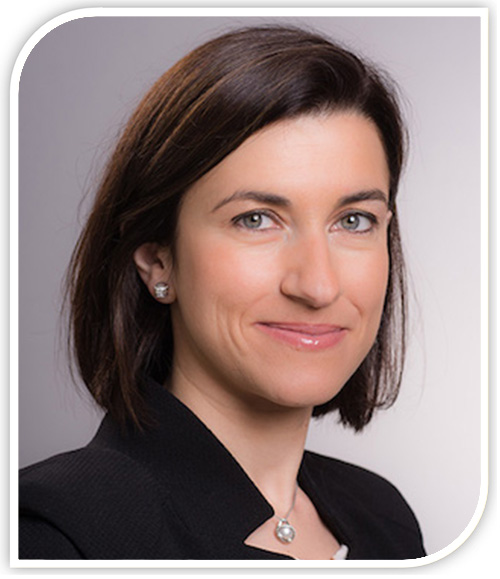 Dr. Annalisa Terranegra from Sidra Medical and Research Center, Qatar, will chair a session dedicated to Diet as Microbiome and Epigenetic Modulator in Diabetes and Obesity during the congress.
Dr. Annalisa Terranegra from Sidra Medical and Research Center, Qatar, will chair a session dedicated to Diet as Microbiome and Epigenetic Modulator in Diabetes and Obesity during the congress.
The main topic of this session is to discuss epigenetic activity of the microbiota and its metabolites as mechanism controlling the host-microbe interaction.
If you wish to present a short oral presentation during this session, please submit your abstract here.
Among the speakers of this session:
 Gut Microbiota as Important Mediator Between Diet and DNA Methylation and Histone Modifications in the Host Gut Microbiota as Important Mediator Between Diet and DNA Methylation and Histone Modifications in the HostDina Bellizzi, University of Calabria, Italy |
Targeting Microbiota 2021 Congress
October 20-22, 2021 - Paris, France & Online
www.microbiota-site.com
A session dedicated to Microbiota and Antibiotics
During the Targeting Microbiota 2021 Congress, a special session dedicated to "Microbiota and Antibiotics" will be organized and will be chaired by Dr. Maria Cecilia Giron, University of Padova, Italy.
Among the Speakers:
|
Summary: Antibiotics are life-saving medications but any time they are administered, they can cause side effects and contribute to the development of antibiotic resistance. Disruptions in the neuroimmune interactions between gut microbiota and enteric nervous system during critical developmental windows by antibiotic exposure, have been linked to increased susceptibility of the host to several diseases mediated by the microbiota-gut-brain axis, ranging from irritable bowel syndrome to psychiatric and neurologic disorders.
|
|
Summary: The gastrointestinal (GI) tract is a complex multifunctional organ where commensals microbes and their related metabolites in the lumen modulate several neuronal, immune, and endocrine cellular systems in the gut wall, such as the enteric nervous system or outside the GI tract, such as the brain. The mechanisms behind this intimate crosstalk are beginning to be elucidated, and they are crucial not only for understanding the pathophysiology of functional intestinal diseases but also for identifying biomarkers that describe and help cure neurological disorders with GI comorbidities. This talk will explore the recent research on antibiotics as a tool to explore the gut microbiota-host neuro-endocrine-immune interactions and the relevance of these studies for the disorders of the microbiota-gut-brain axis. |

Joshua Lyte, University of Arkansas, USA Summary: For decades the poultry industry has supplemented feed with antibiotics in order to improve avian growth performance, maintain intestinal health, and suppress colonization by foodborne pathogens that cause severe diseases in human consumers. With this decades-old practice of antibiotic feed supplementation rapidly coming to an end, the poultry industry is examining how the microbiome can be harnessed to promote intestinal health and prevent colonization by foodborne pathogens. The evolutionary, neurochemical-based, cross-talk between the microbiome and the host, known as microbial endocrinology, provides a framework to elucidate the mechanisms by which the microbiome influences poultry health and exclusion of foodborne pathogens. As members of the microbiota both produce and recognize the same neurochemicals that are produced by the host’s intestinal nervous system and enteroendocrine cells, use of a microbial endocrinology-based context represents a unique approach to identify relevant mechanisms as well as design interventions to promote poultry health, and ultimately human health as well. |
If you wish to present a short oral presentation during this session, please submit your abstract here.
Targeting Microbiota 2021 Congress
October 20-22, 2021 - Paris, France & Online
www.microbiota-site.com
The Microbiome as a Bridge Linking Antibiotics and Intestinal Function
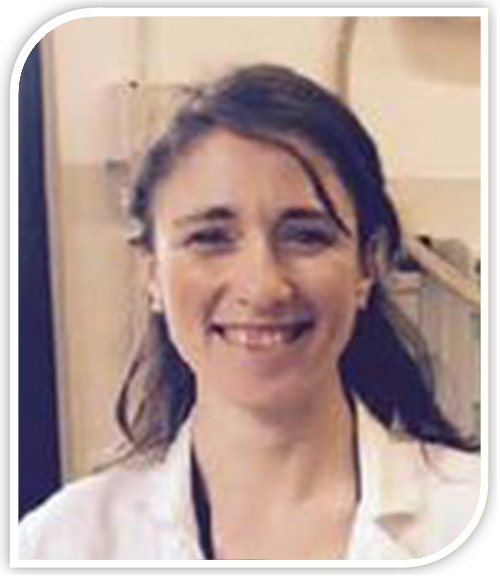 Dr. Valentina Caputi, from the University of Arkansas, USA, will join the Targeting Microbiota 2021 Congress which will be held on October 20-22, 2021 at UNESCO Paris & Online.
Dr. Valentina Caputi, from the University of Arkansas, USA, will join the Targeting Microbiota 2021 Congress which will be held on October 20-22, 2021 at UNESCO Paris & Online.
During the conference, Dr. Caputi will present "The Microbiome as a Bridge Linking Antibiotics and Intestinal Function" in session which will be shared with Dr. Maria Cecilia and Dr. Joshua Lyte.
Summary of Talk: The gastrointestinal (GI) tract is a complex multifunctional organ where commensals microbes and their related metabolites in the lumen modulate several neuronal, immune, and endocrine cellular systems in the gut wall, such as the enteric nervous system or outside the GI tract, such as the brain. The mechanisms behind this intimate crosstalk are beginning to be elucidated, and they are crucial not only for understanding the pathophysiology of functional intestinal diseases but also for identifying biomarkers that describe and help cure neurological disorders with GI comorbidities. This talk will explore the recent research on antibiotics as a tool to explore the gut microbiota-host neuro-endocrine-immune interactions and the relevance of these studies for the disorders of the microbiota-gut-brain axis.
Targeting Microbiota 2021 Congress
October 20-22, 2021 - Paris, France & Online
www.microbiota-site.com
Gut Microbiota Interactions with Cognitive Function
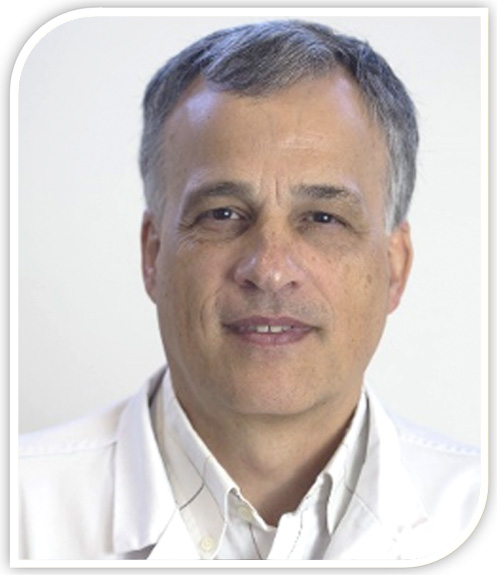
Prof. José-Manuel Fernández-Real from Hospital de Girona "Dr Josep Trueta", Universitat de Girona, Spain will join the Targeting Microbiota 2021 Congress which will be held on October 20-22, 2021 and give a presentation entitled "Gut Microbiota Interactions with Cognitive Function".
Summary of Talk:
- Gut microbiome composition and functionality have been recently found to be linked to immediate and short-term memory and several tests evaluating inhibitory control in subjects with and without obesity.
- Brain structures associated with these cognitive domains were also associated with gut microbiome alterations.
- The impairments in immediate memory and in inhibitory control of the donors were phenocopied to recipient mice through faecal microbiota transplantation, resulting in alterations of memory, reversal learning and changes in mouse brain transcriptomics.
Targeting Microbiota 2021 Congress
October 20-22, 2021 - Paris, France & Online
www.microbiota-site.com
Deciphering the Effect of Bacteria on Protein Conformational Diseases
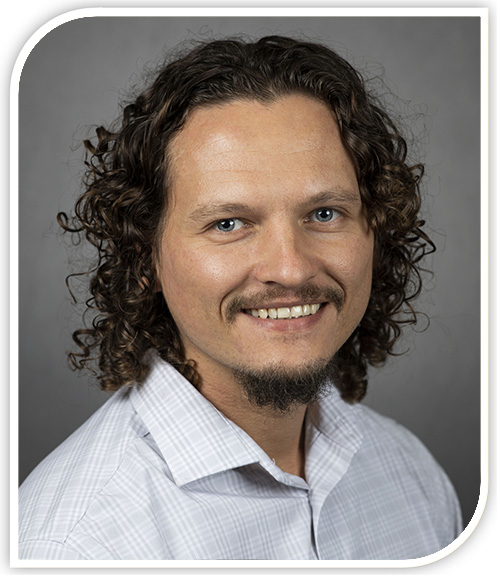 Dr. Daniel M Czyz from University of Florida, USA will join the Targeting Microbiota 2021 congress which will be held on October 20-22, 2021 and will present a presentation entitled "Deciphering the effect of bacteria on protein conformational diseases".
Dr. Daniel M Czyz from University of Florida, USA will join the Targeting Microbiota 2021 congress which will be held on October 20-22, 2021 and will present a presentation entitled "Deciphering the effect of bacteria on protein conformational diseases".
Summary of talk: Recent studies suggest that bacteria contribute to neurodegenerative protein conformational diseases. However, which bacteria and how do microbes contribute to these diseases is not well understood. Our work reveals which bacteria affect host proteostasis and potentially contribute to the pathogenesis of neurodegenerative diseases.
Targeting Microbiota 2021 Congress
October 20-22, 2021 - Paris, France & Online
www.microbiota-site.com
Gut-Brain Axis Regulation of Alzheimer’s Disease Pathology
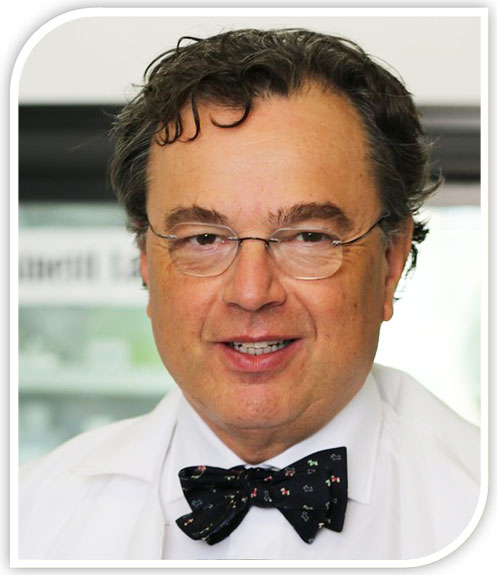 Prof. Giulio M Pasinetti from Icahn School of Medicine at Mount Sinai, USA will chair a session dedicated to Brain and Microbiota and will present the topic entitled "Gut-Brain Axis Regulation of Alzheimer’s Disease Pathology".
Prof. Giulio M Pasinetti from Icahn School of Medicine at Mount Sinai, USA will chair a session dedicated to Brain and Microbiota and will present the topic entitled "Gut-Brain Axis Regulation of Alzheimer’s Disease Pathology".
Targeting Microbiota 2021 Congress
October 20-22, 2021 - Paris, France & Online
www.microbiota-site.com
Evaluation of the Effect of Storage Methods on Fecal, Saliva, and Skin Microbiome Composition
 Dr. Se Jin Song from Center for Microbiome Innovation, Jacobs School of Engineering, US San Diego, USA will join the Targeing Microbiota 2021 Congress and will present her recent research article entitled "Evaluation of the Effect of Storage Methods on Fecal, Saliva, and Skin Microbiome Composition".
Dr. Se Jin Song from Center for Microbiome Innovation, Jacobs School of Engineering, US San Diego, USA will join the Targeing Microbiota 2021 Congress and will present her recent research article entitled "Evaluation of the Effect of Storage Methods on Fecal, Saliva, and Skin Microbiome Composition".
Article extract: As the number of human microbiome studies expand, it is increasingly important to identify cost-effective, practical preservatives that allow for room temperature sample storage. Here, we reanalyzed 16S rRNA gene amplicon sequencing data from a large sample storage study published in 2016 and performed shotgun metagenomic sequencing on remnant DNA from this experiment. Both results support the initial findings that 95% ethanol, a nontoxic, cost-effective preservative, is effective at preserving samples at room temperature for weeks. We expanded on this analysis by collecting a new set of fecal, saliva, and skin samples to determine the optimal ratio of 95% ethanol to sample. We identified optimal collection protocols for fecal samples (storing a fecal swab in 95% ethanol) and saliva samples (storing unstimulated saliva in 95% ethanol at a ratio of 1:2). Storing skin swabs in 95% ethanol reduced microbial biomass and disrupted community composition, highlighting the difficulties of low biomass sample preservation. The results from this study identify practical solutions for large-scale analyses of fecal and oral microbial communities.
Targeting Microbiota 2021 Congress
October 20-22, 2021 - Paris, France & Online
www.microbiota-site.com
Human gut microbiome signature reflects healthy aging and predicts survival in the latest decades of life
 Dr. Sean M. Gibbons from Institute for Systems Biology, University of Washington, USA will join the Targeting Microbiota 2021 congress and will present his recent study on Human gut microbiome signature reflects healthy aging and predicts survival in the latest decades of life.
Dr. Sean M. Gibbons from Institute for Systems Biology, University of Washington, USA will join the Targeting Microbiota 2021 congress and will present his recent study on Human gut microbiome signature reflects healthy aging and predicts survival in the latest decades of life.
Prof. Gibbons highlights: The ecological dynamics of the human gut microbiome are characterized by rapid change in early life (0-3 years), followed by a long period of stability, and ending with steady changes associated with advanced age (> 65 years). While certain aging-related patterns in the gut microbiota have been linked to a concomitant decline in health, there is no clear definition of 'healthy aging' from the perspective of the gut microbiome. We leverage three independent, large, deeply phenotyped cohorts to show how increasing gut microbiome uniqueness and an associated rise in anti-inflammatory microbial metabolites in the blood are associated with healthier aging and increased survival in the latest decades of life.
Targeting Microbiota 2021 Congress
October 20-22, 2021 - Paris, France & Online
www.microbiota-site.com
Gut Microbiota as Important Mediator Between Diet and DNA Methylation and Histone Modifications in the Host
 Prof. Dina Bellizzi from University of Calabria, Italy will talk about "Gut Microbiota as Important Mediator Between Diet and DNA Methylation and Histone Modifications in the Host".
Prof. Dina Bellizzi from University of Calabria, Italy will talk about "Gut Microbiota as Important Mediator Between Diet and DNA Methylation and Histone Modifications in the Host".
The human gut microbiota is a complex ecosystem consisting of trillions of microorganisms that inhabit symbiotically on and in the human intestine. They carry out, through the production of a series of metabolites, many important metabolic functions that complement the activity of mammalian enzymes and play an essential role in host digestion. Interindividual variability of microbiota structure, and consequently of the expression of its genes (microbiome), was largely ascribed to the nutritional regime. Diet influences microbiota composition and function with short- and long-term effects. In spite of the vast literature, molecular mechanisms underlying these effects still remain elusive. In this review, we summarized the current evidence on the role exerted by gut microbiota and, more specifically, by its metabolites in the establishment of the host epigenome. The interest in this topic stems from the fact that, by modulating DNA methylation and histone modifications, the gut microbiota does affect the cell activities of the hosting organism.
For more details about article, please follow: https://doi.org/10.3390/nu12030597
Targeting Microbiota 2021 Congress
October 20-22, 2021 - Paris, France & Online
www.microbiota-site.com
FMT 2021: Reorganization and Perspective
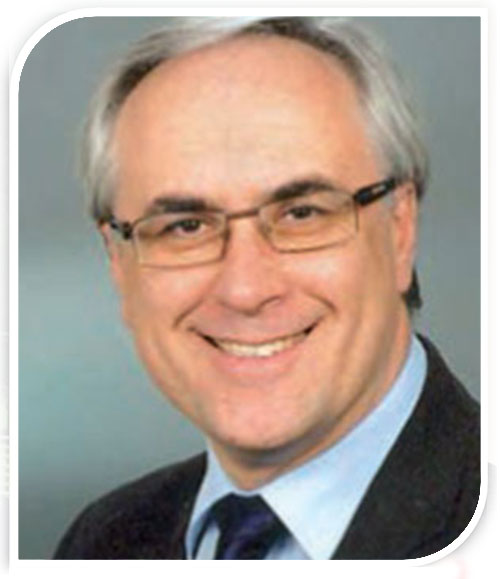
Prof. Peter C. Konturek, President of ISM from Teaching Hospital of the University of Jena, Germany will present a talk entitled "FMT 2021: Reorganization and Perspective".
Prof. Konturek will present new data on FMT and include important remarks on the reorganization of fecal microbiota therapy due to the SARS Cov2 Pandemic.
Targeting Microbiota 2021 Congress
October 20-22, 2021 - Paris, France & Online
www.microbiota-site.com
The Microbiome of IBD and the Potential of Machine Learning
 Dr. Marcus Claesson from University College Cork, Ireland will join the Targeting Microbiota 2021 Virtual Congress scheduled on October 20-22, 2021, and will give a presentation entitled "The Microbiome of IBD and the Potential of Machine Learning".
Dr. Marcus Claesson from University College Cork, Ireland will join the Targeting Microbiota 2021 Virtual Congress scheduled on October 20-22, 2021, and will give a presentation entitled "The Microbiome of IBD and the Potential of Machine Learning".
The talk will cover two of the largest published microbiome studies of inflammatory bowel disease. In addition to highlighting how combinations of omics data can deepen host-microbiome insights, promising avenues for diagnostics and prognostics using Machine Learning will be discussed.
Targeting Microbiota 2021 Congress
October 20-22, 2021 - Paris, France & Online
www.microbiota-site.com
Human Gut Microbes and COVID-19
 Prof. Lanjuan Li from Zhejiang University, China will join the Targeting Microbiota 2021 which will be organized on October 20-22, 2021 and give a major presentation entitled "Human Gut Microbes and COVID-19".
Prof. Lanjuan Li from Zhejiang University, China will join the Targeting Microbiota 2021 which will be organized on October 20-22, 2021 and give a major presentation entitled "Human Gut Microbes and COVID-19".
Prof. Li will highlight these three points :
1. Alterations of gut microbiota in patients with COVID-19.
2. Prediction value of gut microbiota in diagnose and illness severity of COVID-19.
3. The potential value of probiotic intervention in the treatment of COVID-19.
Targeting Microbiota 2021 Congress
October 20-22, 2021 - Paris,France & Online
www.microbiota-site.com
An Ecological Framework to Understand the Efficacy of Fecal Microbiota Transplantation
 Prof. Yang-Yu Liu from Harvard Medical School & Brigham and Women's Hospital, USA will join the Targeting Microbiota 2021 Congress which will be held on October 20-22, 2021 and give a presentation entitled "An Ecological Framework to Understand the Efficacy of Fecal Microbiota Transplantation".
Prof. Yang-Yu Liu from Harvard Medical School & Brigham and Women's Hospital, USA will join the Targeting Microbiota 2021 Congress which will be held on October 20-22, 2021 and give a presentation entitled "An Ecological Framework to Understand the Efficacy of Fecal Microbiota Transplantation".
Summary of the talk: Here we present an ecological framework to understand the efficacy of fecal microbiota transplantation (FMT) in treating conditions associated with a disrupted gut microbiota, using the recurrent Clostridioides difficile infection as a prototype disease. This framework predicts several key factors that determine the efficacy of FMT. Moreover, it offers an efficient algorithm for the rational design of personalized probiotic cocktails to decolonize pathogens. We analyze data from both preclinical mouse experiments and a clinical trial of FMT to validate our theoretical framework. The presented results significantly improve our understanding of the ecological principles of FMT and have a positive translational impact on the rational design of general microbiota-based therapeutics.
Targeting Microbiota 2021 Congress
October 20-22, 2021 - Paris,France & Online
www.microbiota-site.com
Mitochondrial dysfunction caused by bacteria activates intrinsic apoptosis and inflammation

Monash Biomedicine Discovery Institute (BDI) scientists have discovered a previously unknown method used by bacteria to evade immune responses.
The study, published in Nature Microbiology, points to potential new ways of countering bacterial infections, which are becoming increasingly resistant to antibiotics.First author Dr Pankaj Deo said researchers in Dr Thomas Naderer’s laboratory took a different approach to understanding the process by which bacteria release toxins that disarm the “powerhouse” mitochondria in immune cells.The study showed that immune cells sense that their mitochondria are no longer functional during infections, which triggers apoptosis. “Ironically, it is the activation of host cell death factors that deliver the final blow to mitochondria which induces apoptosis, not the bacterial toxins themselves,” Dr Pankaj said.The researchers genetically targeted apoptotic factors and showed that they were able to reduce inflammation in mice, which increased health outcomes.They used the bacterial pathogens Neisseria gonorrhoeae, uropathogenic Escherichia coli and the deadly Pseudomonas aeruginosa, prevalent in hospitals and which can be multi-drug resistant. However, the findings would apply to other species of bacteria too, Dr Deo said.Dr Naderer, who oversaw the research, said that understanding the ways some bacterial infections evade immune response by targeting mitochondria opens new therapeutic possibilities.“There’s been a lot of effort trying to block endotoxins that kill immune cells but this study really shifts the focus onto different toxins that might be more important,” Dr Naderer said.“It gives us a few good leads that we can look at as a next step,” he said.“We’ve shown in this paper that we can accelerate the immune response,” he said. “The other side is that if that response persists and we get constant inflammation – which is usually associated with bacterial infection and which causes a lot of tissue damage – we have a new way to shut down that tissue-damaging inflammation.”“What scientists have thought before is that when endotoxins are released by bacteria they induce an inflammatory type of programmed cell death called pyroptosis in immune cells,” Dr Deo said. Endotoxins are part of the external cell wall of essentially all Gram-negative bacteria.“We’ve found that the pathogenic bacteria use a similar mechanism to release additional toxins,” he said. “They kill immune cells by releasing small surface structures called outer membrane vesicles – packages of toxins that target mitochondria. The mitochondria are disarmed, become dysfunctional then die according to apoptosis or cellular suicide.”The scientists will investigate drugs that are now advancing to the clinic, and at repurposing drugs already in use, perhaps as anti-cancer treatments, to see if they can be used to clear bacterial infections.
News source: www.technologynetworks.com
Article: Deo et al. (2020). Mitochondrial dysfunction caused by outer membrane vesicles from Gram-negative bacteria activates intrinsic apoptosis and inflammation. Nature Microbiology. DOI: https://doi.org/10.1038/s41564-020-0773-2
First successful delivery of mitochondria to liver cells in animals

University of Connecticut researcher Dr. George Wu recently published a paper in the Journal of Gastroenterology and Hepatology outlining his successful experiment delivering mitochondria to liver cells.
This groundbreaking experiment marks the first time researchers have ever successfully introduced mitochondria into specific cells in living animals.
Mitochondria generate energy from the conversion of fatty acids and carbohydrates to carbon dioxide and water, powering cells throughout the body. There is a significant link between mitochondrial damage and various liver diseases. When mitochondria are damaged, they cannot provide the liver with enough energy to function normally. This results in liver cell death and liver failure.
Currently, the only treatment for liver failure is a complete organ transplant. Surgeons perform approximately 8,000 liver transplants per year in the United States, but because of a shortage of donor livers, thousands more people on the waitlist for a transplant will die before receiving one.
Using their knowledge of a well-characterized receptor on the liver, Wu and his team previously showed mitochondria can be coated with certain carrier proteins which lead the liver to recognize them and take them up. These proteins have exposed galactose, a kind of sugar, on their surface. The galactose acts as a signal for the liver to internalize that protein.
“We took advantage of a normal, natural mechanism,” Wu says.
This paper finds that healthy mitochondrial complexes can be delivered to the livers of living rats through simple intravenous injection.
The team harvested mitochondria from mouse specimens. The mitochondria were mixed with a protein carrier and purified to form complexes which could be taken into the liver.
Along with the mitochondria, Wu injected a peptide which facilitated the release of the mitochondria once they reached the cells. This peptide allowed the mitochondria to be taken up into the liver cells’ cytoplasm rather than digested, which is what the liver does to most molecules it internalizes.
“If you don’t have that, mitochondria might be targeted to liver cells, but they would be destroyed,” Wu says.
At the end of the experiment, Wu and his colleagues found approximately 27% of the total injected mitochondria were detected in the liver, a significant proportion for therapeutic use.
Less than 2% were found in the spleen and less than 1% in the lungs, suggesting the uptake was not random and evenly distributed throughout all organs. In other words, the researchers were successful in creating a protein coating that made mitochondria specifically identifiable and internalized by the liver.
The achievement was far from a foregone conclusion, since mitochondria do not normally travel through the blood stream. The many potentially lethal obstacles made it a harrowing journey to the liver by way of veins to the heart, the lungs, and finally through arteries to the liver and the rest of the body. The coated mitochondria were apparently able to survive contact with blood cells, blood proteins, narrow blood vessels, and potential attacks from the immune system.
“To me, it’s rather amazing that we could detect any donor mitochondria at all,” Wu says. “When you consider all the obstacles that could get in the way.”
While this experiment only measured the short-term effects of mitochondrial transplant, there are potential long-term benefits.
Mitochondria have their own DNA and RNA, meaning they can reproduce independently of the rest of the cell. The transplanted mitochondria may replicate with the cells during cell division.
All cells have a certain number of mitochondria they need to sustain their activities. Wu speculates that cells may gradually eliminate the damaged mitochondria as the healthy, donor mitochondria increase in number until they have the proper number of healthy mitochondria.
The next step for this research is to test the method with rats who have mitochondrial liver damage. This will display clinical relevance for potentially developing this technique for treatment of liver diseases.
This process has the potential to address a serious gap in treatment for liver diseases. It may even eventually be used to treat other maladies throughout the body affected by mitochondrial malfunction or damage.
Wu is now working with UConn’s tech transfer group and has been issued a patent on targeted transplantation of mitochondria to hepatocytes. The University has filed patent protection on the proof of principle in animals. For more information about this technology for partnering and/or licensing contact Ana Fidantsef ([email protected]).
Wu received an M.D. and Ph.D. from the Albert Einstein College of Medicine in biochemistry and medicine. He completed his residency at the Harlem Hospital Center, Columbia College of Physicians and Surgeons, and fellowship training in gastroenterology-hepatology at Albert Einstein College of Medicine. He is currently a professor of medicine, Chief of Hepatology, and holds the Herman Lopata Chair in Hepatitis Research. His clinical interests include general gastroenterology, endoscopy, ultrasound-assisted liver biopsy and ultrasound-assisted paracentesis, but the focus is on liver disease.
News Source: www.uconn.edu
Influenza: combating bacterial superinfection with the help of the microbiota
 Technology vector created by brgfx - www.freepik.com
Technology vector created by brgfx - www.freepik.com
Researchers from the Lille Centre for Infection and Immunity (CNRS/INSERM/Institut Pasteur de Lille/University of Lille/CHU Lille), INRAE and from Brazilian (Belo Horizonte), Scottish (Glasgow) and Danish (Copenhagen) laboratories have shown for the first time in mice that perturbation of the gut microbiota caused by the influenza virus favours secondary bacterial superinfection. Published in Cell Reports on March 3, 2020, these results open up new prospects for the prevention and treatment of bacterial pneumonia, a major cause of death in elderly or vulnerable people infected with the influenza virus.
Influenza and its complications continue to be a significant public health concern as well as a major social and economic burden. Vaccination campaigns, together with the discovery of new antiviral therapies, provide preventive and therapeutic solutions. However, impairment of defence mechanisms against secondary bacterial infections, which considerably worsen the clinical picture of people with influenza, remains a major problem.
Specializing in the field of pulmonary immunity, a team led by François Trottein, a CNRS researcher at the Lille Centre for Infection and Immunity focused on the gut microbiota, well known for their key role in many physiological processes, including immune defence mechanisms. Scientists have shown that, in mice, influenza temporarily alters the composition and metabolic activity of the gut microbiota, probably due to reduced food consumption during illness. During influenza, the production of short-chain fatty acids by the bacteria of the microbiota is also diminished. The team has now shown that these fatty acids remotely favour the bactericidal activity of macrophages present in the lungs. Perturbation of the intestinal microbiota by influenza thus compromises lung defences, particularly against Streptococcus pneumoniae, the leading cause of bacterial pneumonia in humans.
The researchers also showed that this sensitivity to bacterial superinfection can be corrected by treatment with acetate, one of the main short-chain fatty acids produced by the microbiota. Their work could have practical applications for the well-being of infected patients, who would be better protected against influenza-related complications. This work was made in collaboration with scientists from the Micalis Institute (INRAE/AgroParistech/Université Saclay), the Lille Inflammation Research International Center (INSERM/Université de Lille/CHU Lille), the Laboratory of Design and Application of Bioactive Molecules (CNRS/University of Strasbourg), the Molecular Virology and Immunology Unit (INRAE) and GenoScreen (Lille), the Universidade Federal de Minas Gerais (Belo Horizonte, Brazil), the Institute of Molecular, Cell and Systems Biology (Glasgow, Scotland) and the Department of Pharmacology (University of Copenhagen, Denmark). This discovery represents a major breakthrough in the understanding of the mechanisms behind bacterial superinfections in influenza patients. It could lead to the development of new nutritional and/or therapeutic strategies to better control bacterial infections.
News source: https://www.eurekalert.org/
Analysis of oral microbiome from fossil human remains revealed the significant differences in virulence factors of modern and ancient Tannerella forsythia
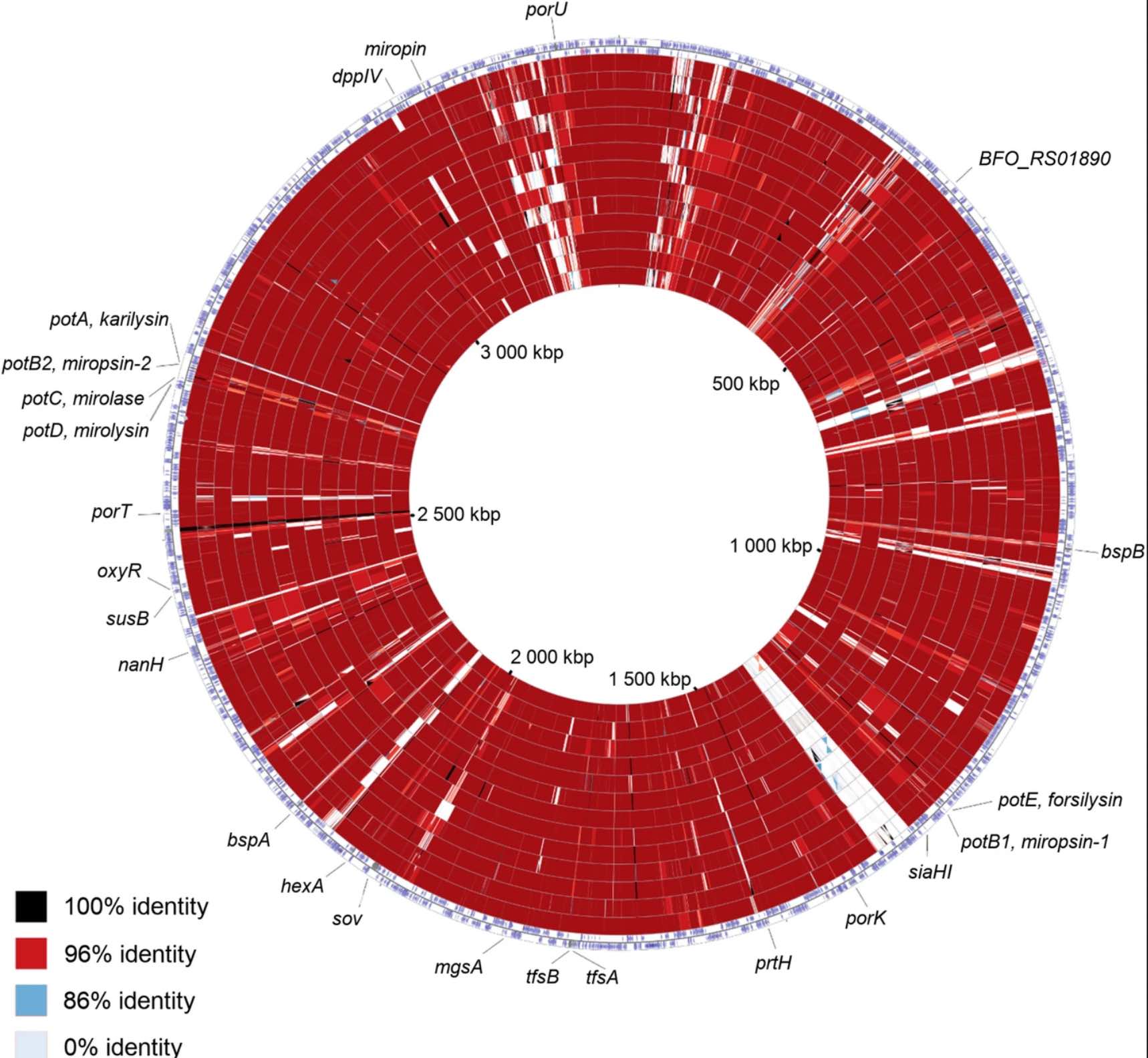 Figure: ©biomedcentral.com
Figure: ©biomedcentral.comBackground
Recent advances in the next-generation sequencing (NGS) allowed the metagenomic analyses of DNA from many different environments and sources, including thousands of years old skeletal remains. It has been shown that most of the DNA extracted from ancient samples is microbial. There are several reports demonstrating that the considerable fraction of extracted DNA belonged to the bacteria accompanying the studied individuals before their death.
Results
In this study we scanned 344 microbiomes from 1000- and 2000- year-old human teeth. The datasets originated from our previous studies on human ancient DNA (aDNA) and on microbial DNA accompanying human remains. We previously noticed that in many samples infection-related species have been identified, among them Tannerella forsythia, one of the most prevalent oral human pathogens. Samples containing sufficient amount of T. forsythia aDNA for a complete genome assembly were selected for thorough analyses. We confirmed that the T. forsythia-containing samples have higher amounts of the periodontitis-associated species than the control samples. Despites, other pathogens-derived aDNA was found in the tested samples it was too fragmented and damaged to allow any reasonable reconstruction of these bacteria genomes. The anthropological examination of ancient skulls from which the T. forsythia-containing samples were obtained revealed the pathogenic alveolar bone loss in tooth areas characteristic for advanced periodontitis. Finally, we analyzed the genetic material of ancient T. forsythia strains. As a result, we assembled four ancient T. forsythia genomes - one 2000- and three 1000- year-old. Their comparison with contemporary T. forsythia genomes revealed a lower genetic diversity within the four ancient strains than within contemporary strains. We also investigated the genes of T. forsythia virulence factors and found that several of them (KLIKK protease and bspA genes) differ significantly between ancient and modern bacteria.
Conclusions
In summary, we showed that NGS screening of the ancient human microbiome is a valid approach for the identification of disease-associated microbes. Following this protocol, we provided a new set of information on the emergence, evolution and virulence factors of T. forsythia, the member of the oral dysbiotic microbiome.
News source: www.bmcgenomics.biomedcentral.com
Article Reference: Philips, A., Stolarek, I., Handschuh, L. et al. Analysis of oral microbiome from fossil human remains revealed the significant differences in virulence factors of modern and ancient Tannerella forsythia. BMC Genomics 21, 402 (2020). https://doi.org/10.1186/s12864-020-06810-9
Personalized whole‐body models integrate metabolism, physiology, and the gut microbiome
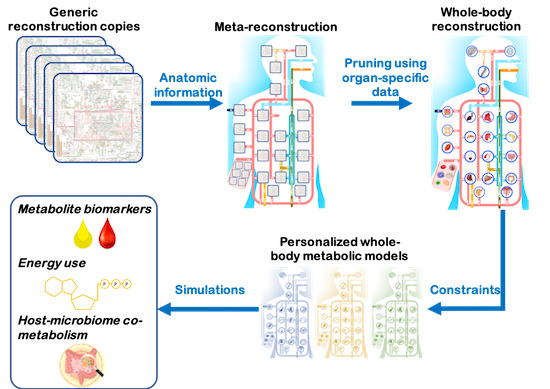 Image from: Mol Syst Biol (2020)16:e8982
Image from: Mol Syst Biol (2020)16:e8982
Comprehensive molecular‐level models of human metabolism have been generated on a cellular level. However, models of whole‐body metabolism have not been established as they require new methodological approaches to integrate molecular and physiological data. We developed a new metabolic network reconstruction approach that used organ‐specific information from literature and omics data to generate two sex‐specific whole‐body metabolic (WBM ) reconstructions. These reconstructions capture the metabolism of 26 organs and six blood cell types. Each WBM reconstruction represents whole‐body organ‐resolved metabolism with over 80,000 biochemical reactions in an anatomically and physiologically consistent manner. We parameterized the WBM reconstructions with physiological, dietary, and metabolomic data. The resulting WBM models could recapitulate known inter‐organ metabolic cycles and energy use. We also illustrate that the WBM models can predict known biomarkers of inherited metabolic diseases in different biofluids. Predictions of basal metabolic rates, by WBM models personalized with physiological data, outperformed current phenomenological models. Finally, integrating microbiome data allowed the exploration of host–microbiome co‐metabolism. Overall, the WBM reconstructions, and their derived computational models, represent an important step toward virtual physiological humans.
News Source: www.embopress.org
Journal Reference:
Personalized whole‐body models integrate metabolism, physiology, and the gut microbiome
Ines Thiele, Swagatika Sahoo, Almut Heinken, Johannes Hertel, Laurent Heirendt, Maike K Aurich, Ronan MT Fleming
Mol Syst Biol. (2020) 16: e8982 https://doi.org/10.15252/msb.20198982
At your Agenda:
8th World Congress on Targeting Microbiota
October 22-23, 2020 - UNESCO, Paris, France
www.microbiota-site.com



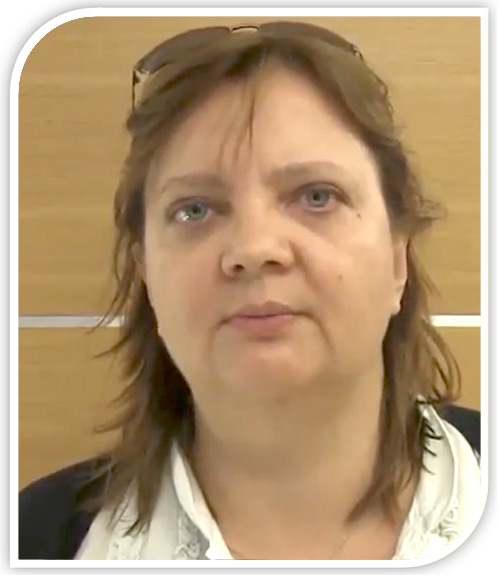 Microbiota and Antibiotics: Introduction
Microbiota and Antibiotics: Introduction


















































